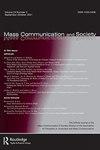愤怒和高兴地跳起来:在COVID-19危机期间,Facebook上的民粹主义和非民粹主义政治家对不文明和后真相沟通的情感反应
IF 2.7
2区 文学
Q1 COMMUNICATION
引用次数: 0
摘要
社交网站为政客们提供了一个机会,通过精心制作的信息来调动粉丝的情绪。我们研究了在COVID-19大流行危机期间,民粹主义和非民粹主义政党领导人的不文明和后真相传播对社交媒体用户表情符号情绪反应的影响。在许多欧洲国家,对辩论的参与者和话题表达不尊重的语气、撒谎指控和不礼貌已经成为当代政治话语的突出方面。我们将在线政治交流中的情感线索研究与政治精英在社交媒体上的信息的影响结合起来。我们采用人工内容分析(N = 2549个帖子)的方法,研究了在2019冠状病毒病大流行期间(2020年3月至2021年2月),捷克政党领导人在Facebook上的政治传播,公众产生了更高的威胁感和不确定性。我们表明,不文明和后真相信息元素,与民粹主义政党的隶属关系以及流行病影响了与政治帖子的情感互动的数量。本文对研究不文明行为和对真实性的攻击如何影响公共辩论中的意见交换或增加社会两极分化具有重要意义。本文章由计算机程序翻译,如有差异,请以英文原文为准。
Fuming Mad and Jumping with Joy: Emotional Responses to Uncivil and Post-Truth Communication by Populist and Non-Populist Politicians on Facebook During the COVID-19 Crisis
Social networking sites offer politicians an opportunity to mobilize followers through carefully crafted messages appealing to their emotions. We examine the effects of uncivil and post-truth communication of populist and non-populist party leaders on the emotional emoji reactions of social media users during the COVID-19 pandemic crisis. Conveying a disrespectful tone toward the participants and topics of the debate, lying accusations, and incivility have become prominent aspects of contemporary political discourse in many European countries. We combine research on emotional cues in online political communication and the effects of political elites’ messages on social media. We apply manual content analysis (N = 2,549 posts) to study the political communication of Czech political party leaders on Facebook during the COVID-19 pandemic (March 2020 to February 2021), which generated a higher sense of threat and uncertainty in the public. We show that uncivil and post-truth message elements, affiliation with a populist party, and pandemic influenced the volume of emotional interactions with political posts. The article has important implications for the study of how incivility and attacks on truthfulness can influence opinion exchange in public debate or increase societal polarization.
求助全文
通过发布文献求助,成功后即可免费获取论文全文。
去求助
来源期刊

Mass Communication and Society
COMMUNICATION-
CiteScore
6.90
自引率
3.30%
发文量
58
期刊介绍:
Mass Communication and Society" mission is to publish articles from a wide variety of perspectives and approaches that advance mass communication theory, especially at the societal or macrosocial level. It draws heavily from many other disciplines, including sociology, psychology, anthropology, philosophy, law, and history. Methodologically, journal articles employ qualitative and quantitative methods, survey research, ethnography, laboratory experiments, historical methods, and legal analysis.
 求助内容:
求助内容: 应助结果提醒方式:
应助结果提醒方式:


